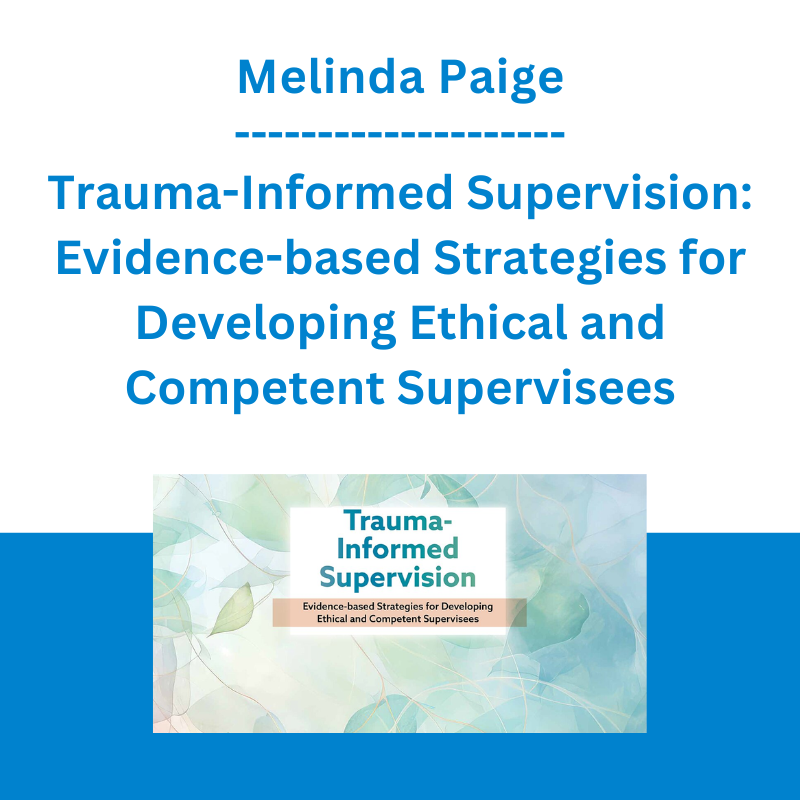*** Proof of Product ***
Exploring the Essential Features of “Melinda Paige – Trauma-Informed Supervision: Evidence-based Strategies for Developing Ethical and Competent Supervisees”
Speaker: Melinda Paige, PhD, LPC, CPCS, NCC
Duration: 6 Hours 16 Minutes
Format: Audio and Video
Copyright: Jun 21, 2024
Media Type: Digital Seminar
Description
Given the prevalence of trauma, no doubt your supervisees’ caseloads are filled with clients who have experienced deeply distressing circumstances.
Effective supervision of trauma cases requires specialized knowledge and skills – without this foundation, you risk harm to clients and supervisees…
…and make the ethical misstep of practicing outside of the bounds of your competency.
That’s why we’ve created this training! Watch Dr. Melinda Paige, founder of the Institute for Trauma Competency, who will use her 25 years of experience helping thousands of supervisors and supervisees alike become trauma competent clinicians to give you the tools and techniques you need to improve your clinical supervision outcomes.
With specific, step-by-step guidance, you’ll upgrade your supervision skills and learn:
- A qualitative model of competency-based trauma knowledge
- Six key principles of a trauma-informed approach
- Four components necessary for competent trauma-sensitive supervision
- Techniques to build and facilitate vicarious resiliency
- The latest ethical principles and standards relating to supervision
- How to foster the wellness and development of supervisees who have themselves been traumatized
- And so much more!
Finish this training knowing that you are practicing ethically and within the bounds of your competency by utilizing evidence-based clinical supervision practices!
Purchase Now!
Speaker
Melinda Paige, PhD, LPC, CPCS, NCC
Melinda Paige, PhD, LPC, CPCS, NCC, is a licensed professional counselor supervisor and a national certified counselor who specializes in resilience and trauma. Dr. Paige earned a PhD in counselor education and supervision and has spent the last twenty years serving as a trauma-competent clinician and clinical supervisor.
Dr. Paige is also a clinical mental health counseling and supervision professor and subject matter expert for trauma impact and counseling curricula. She is the founder of the Institute for Trauma Competency and developed her Trauma Competent Clinician® model based on her qualitative research. She is the recipient of the American Counseling Association Professional Development Award, the Chi Sigma lota International Outstanding Practitioner Award, and the Chi Sigma lota International Outstanding Faculty Award. Dr. Paige has published and presented nationally on resilience and trauma-competent counseling and clinical supervision.
Known for her engaging teaching style, Dr. Paige offers both live and online training and consultation to mental health professionals in competency-based trauma mental health and resilience. Her professional expertise has also made her a sought-after media guest, and she has appeared on NPR affiliates and other national media outlets. She is the founding secretary of the International Association for Resilience and Trauma Counseling, a division of the American Counseling Association.
Speaker Disclosures:
Financial: Dr. Melinda Paige is the Founding Director of the Institute for Trauma Competency, LLC. She has employment relationships with Atlanta Relationship Institute. Capella University and Georgia State University. Dr. Paige receives a speaking honorarium from PESI, Inc. She has no relevant financial relationships with ineligible organizations.
Non-financial: Dr. Melinda Paige is a member of the American Counseling Association, the Association of Counselor Education and Supervision, the International Association for Resilience and Trauma Counseling, the Military and Government Counseling Association, and the Licensed Professional Counselors Association of Georgia.
Objectives
- Identify six principles of a trauma-informed approach to ethical decision making.
- Identify signs to be aware of in supervisee wellness and development.
- Determine how to assess compassion satisfaction and compassion fatigue.
- Choose techniques to facilitate meaning making and self-reflective practices in supervision.
- Define the foundational trauma concepts of prevalence, trauma theory, and principles of trauma-informed-care.
- Utilize counselor-centered supervision techniques as a method of trauma competent supervision.
Outline
Foundations of Trauma-Competent Supervision
- The ubiquity of trauma and physical and psychological consequences
- Critical aspects of competency-based trauma mental health
- Four components necessary for competent trauma-sensitive supervision
- Six key principles of a trauma-informed approach to ethical decision making
- A qualitative model of competency-based trauma knowledge, skills, and attitudinal conditions
Methods of Trauma-Competent Supervision
- A practitioner-centered approach to supervision
- Develop quality relationally-based supervisory alliances
- Trauma-sensitive supervision models and approaches
- Trauma-focused supervision techniques
Ethical Issues in Trauma-Specific Supervision
- The ethics of trauma-competency and professional disposition
- Ethical principles of self-care in clinical practice
- Ethical standards of self-care guidelines
- Six key principles of a trauma-informed approach to ethical decision making
Evaluation of Trauma-Competent Supervisees
- Trauma-informed practitioner competencies for supervisees
- Evaluate secondary traumatic stress/vicarious trauma in supervision
- Assess compassion satisfaction and compassion fatigue
Prevent Vicarious Traumatization and Secondary Traumatic Stress
- Protective factors and strategies in proactive prevention
- Components of practitioner well-being and emotional safety
- Develop trauma-informed communities
- Signs to be aware of in supervisee wellness and development
- Research limitations and risks
Build Vicarious Resiliency
- Facilitate meaning making and selfreflective practices in supervision
- Recognize post-traumatic growth and resilience
- Assess positive effects of helping professions
- Facilitate reconnection and belongness
Trauma-Informed Beliefs and Attitudinal Conditions in Clinical Supervision
- Demonstrate an understanding of contextual and systemic factors
- Apply knowledge about cultural humility and adaptations for survival
- Demonstrate acceptance of unique trauma experiences and respect for client as expert
Beyond Self-Care: Restorative Practices in Clinical Supervision
- Mindfulness practices for grounding and tolerating abreaction
- Autonomic nervous system regulation in supervision
- Modulate ANS arousal with brakes and body awareness
- Facilitate therapeutic presence and reflective practices
Target Audience
- Counselors
- Social Workers
- Psychologists
- Case Managers
- Addiction Counselors
- Therapists
- Art Therapists
- Marriage & Family Therapists
- Physicians
- Nurses
Please see the full list of alternative group-buy courses available here: https://lunacourse.com/shop/










 Chris Capre - Advanced Price Action Ongoing Training & Webinars
Chris Capre - Advanced Price Action Ongoing Training & Webinars  SMB - Options Training
SMB - Options Training  George Fontanills & Tom Gentile - Optionetics 6 DVD Series Home Study Course (Digital Download)
George Fontanills & Tom Gentile - Optionetics 6 DVD Series Home Study Course (Digital Download)  Matan Feldman - The 13-Week Cash Flow Modeling - Wall Street Prep
Matan Feldman - The 13-Week Cash Flow Modeling - Wall Street Prep  The Daily Traders – Exclusive Trading Mentorship Group
The Daily Traders – Exclusive Trading Mentorship Group  Team NFT Money - Ultimate NFT Playbook
Team NFT Money - Ultimate NFT Playbook  Forexmentor - Recurring Forex Patterns
Forexmentor - Recurring Forex Patterns  Sean Messenger - Perfect Eye Contact II - She Looked, Now What
Sean Messenger - Perfect Eye Contact II - She Looked, Now What  Oliver Velez - Essential Strategy Of Trade For Life
Oliver Velez - Essential Strategy Of Trade For Life  Sean Messenger - Real-Deal Rapport 1 & 2
Sean Messenger - Real-Deal Rapport 1 & 2  Sovereign Man Confidential - Renunciation Video
Sovereign Man Confidential - Renunciation Video  Chris Munch & Jay Cruiz - The Asigo System
Chris Munch & Jay Cruiz - The Asigo System  Greg Loehr - Advanced Option Trading With Broken Wing Butterflies
Greg Loehr - Advanced Option Trading With Broken Wing Butterflies  Racing Workshop - Complete Online Package
Racing Workshop - Complete Online Package  Toshko Raychev - Profit System + ITF Assistant
Toshko Raychev - Profit System + ITF Assistant  Zach Reinhardt - Master 3D Sculpting in Blender
Zach Reinhardt - Master 3D Sculpting in Blender  Trade Like Mike - The TLM Playbook 2022
Trade Like Mike - The TLM Playbook 2022  Atlas API Training - API 570 Exam Prep Training Course
Atlas API Training - API 570 Exam Prep Training Course  Erik Banks - Alternative Risk Transfer
Erik Banks - Alternative Risk Transfer